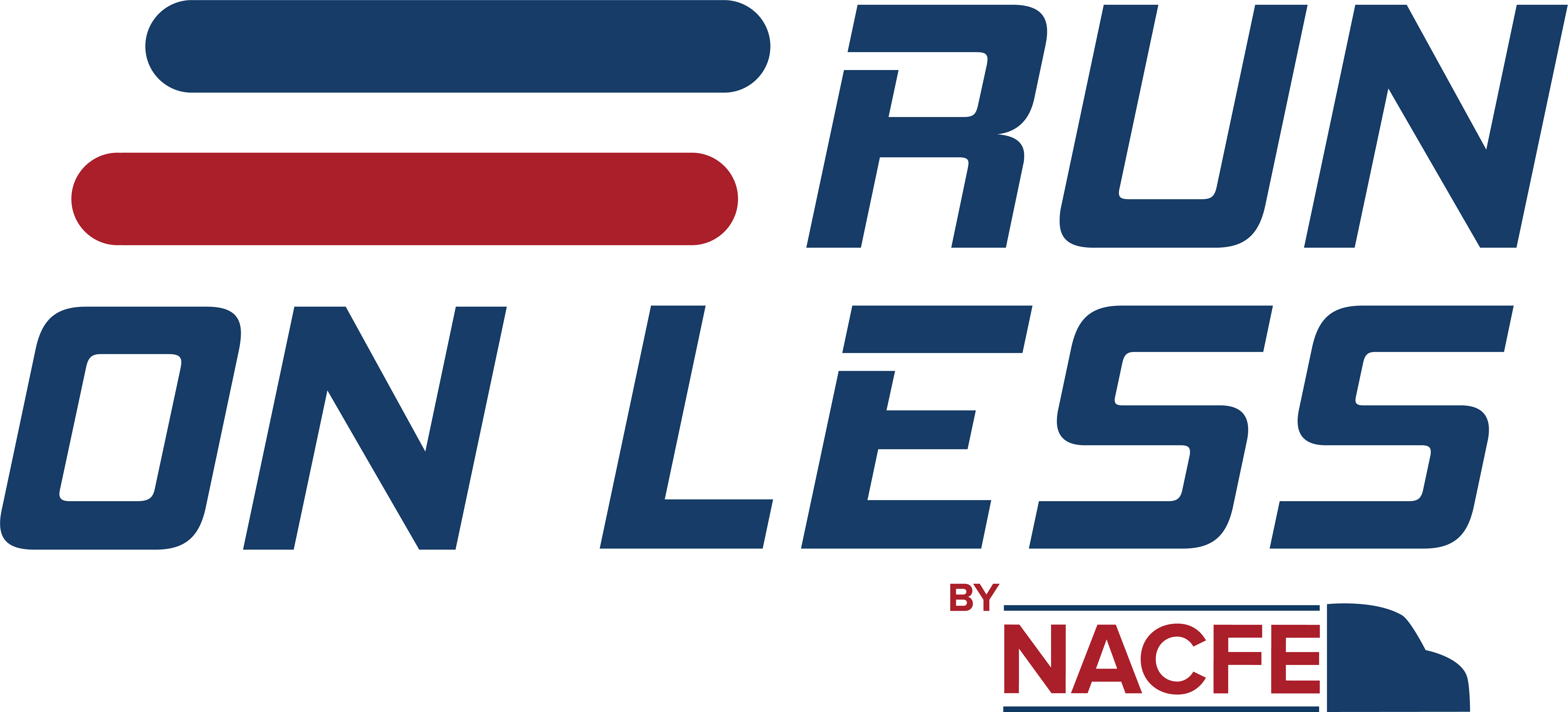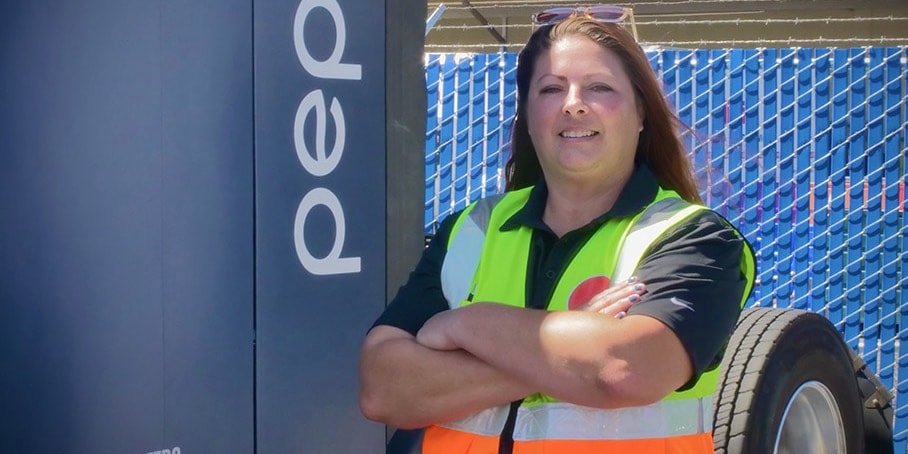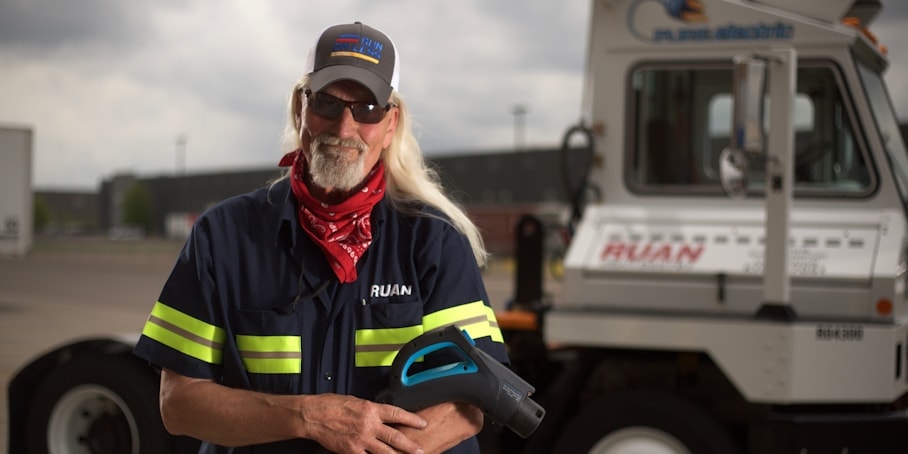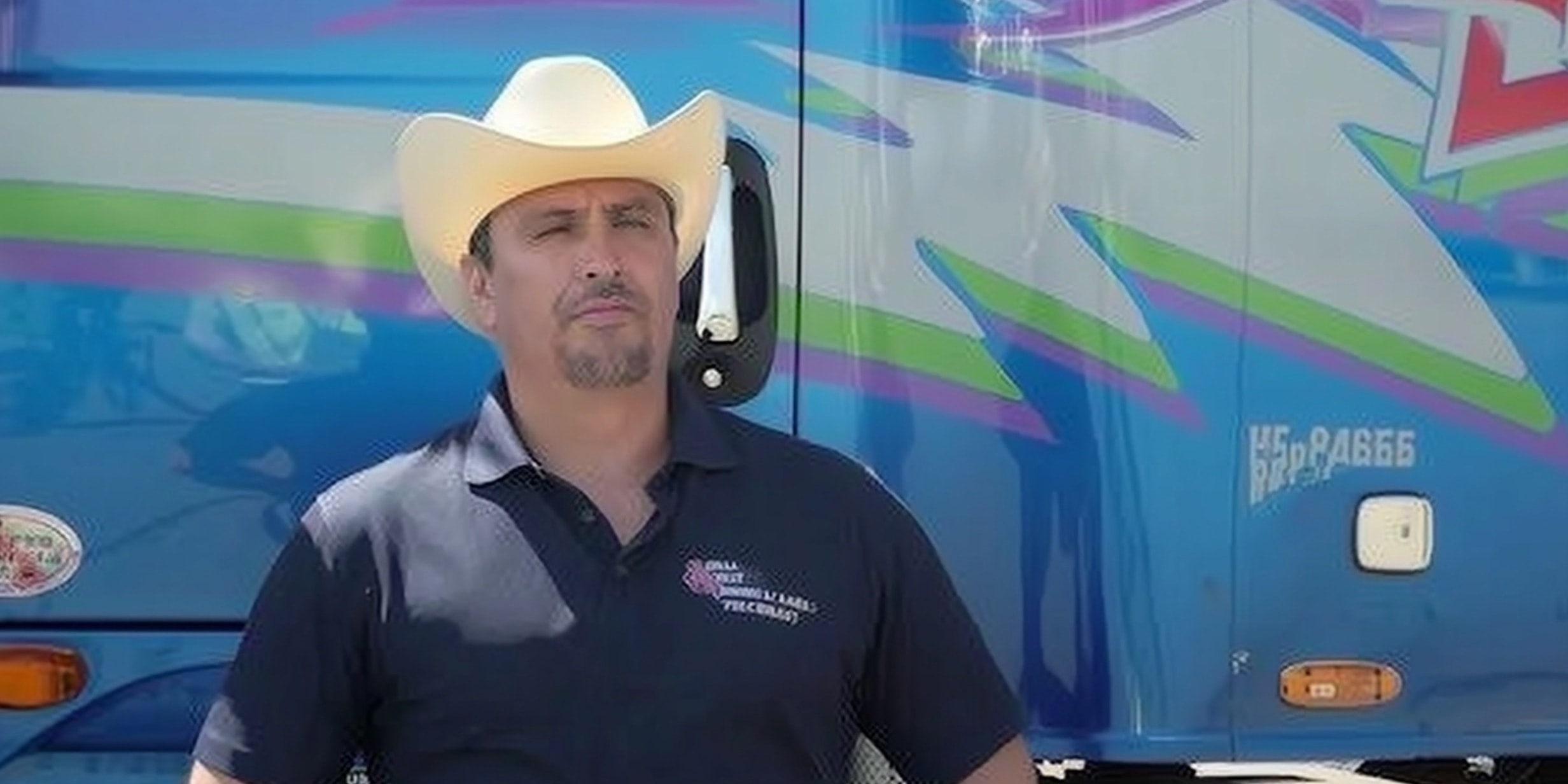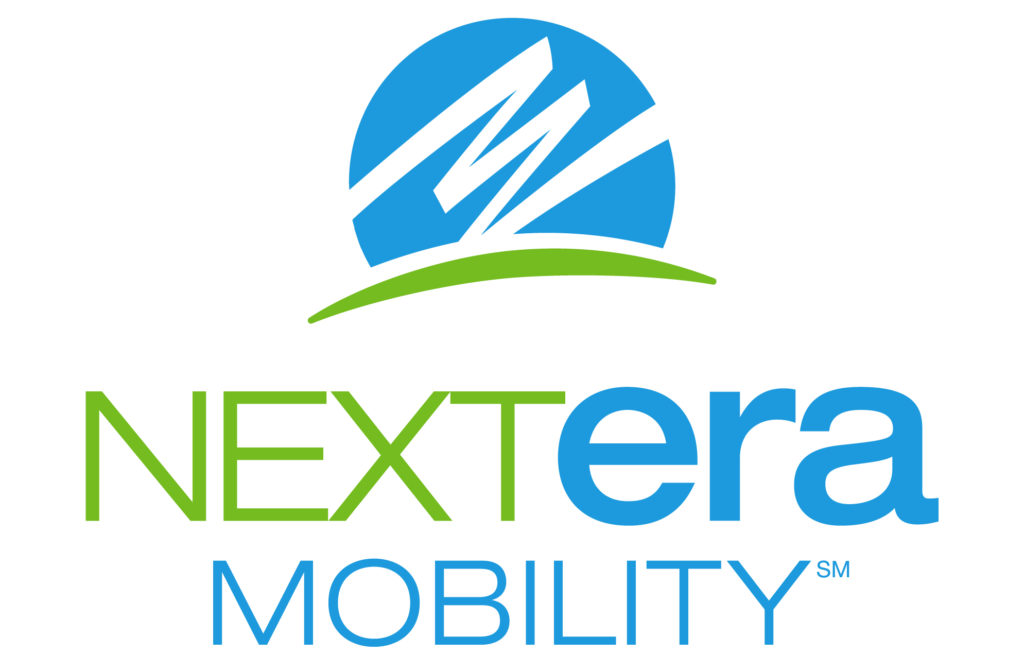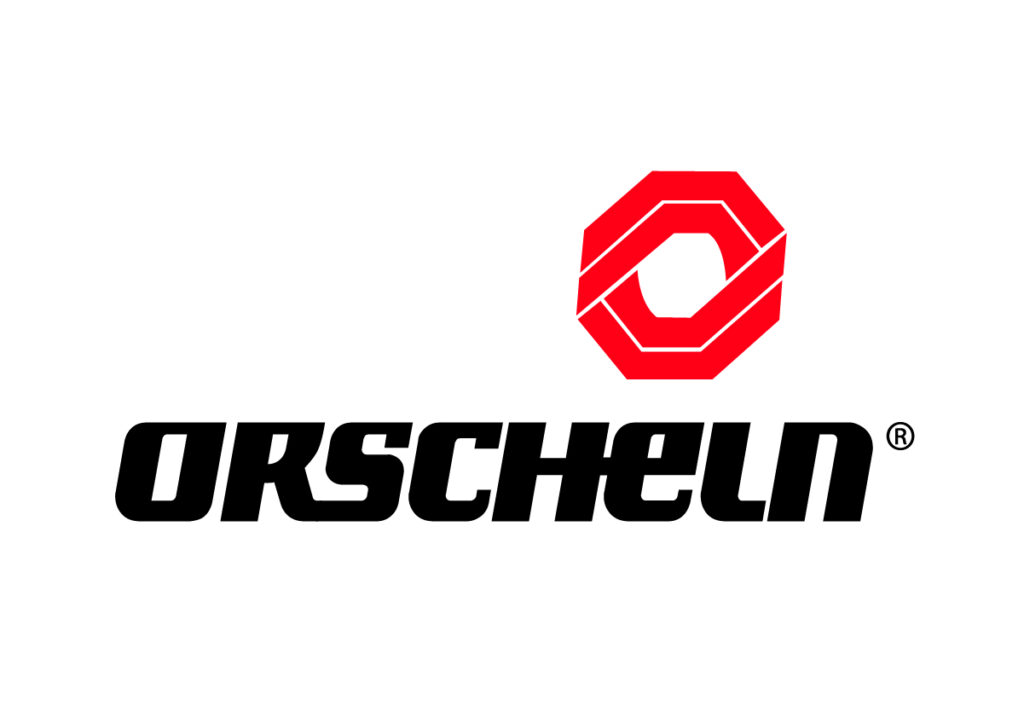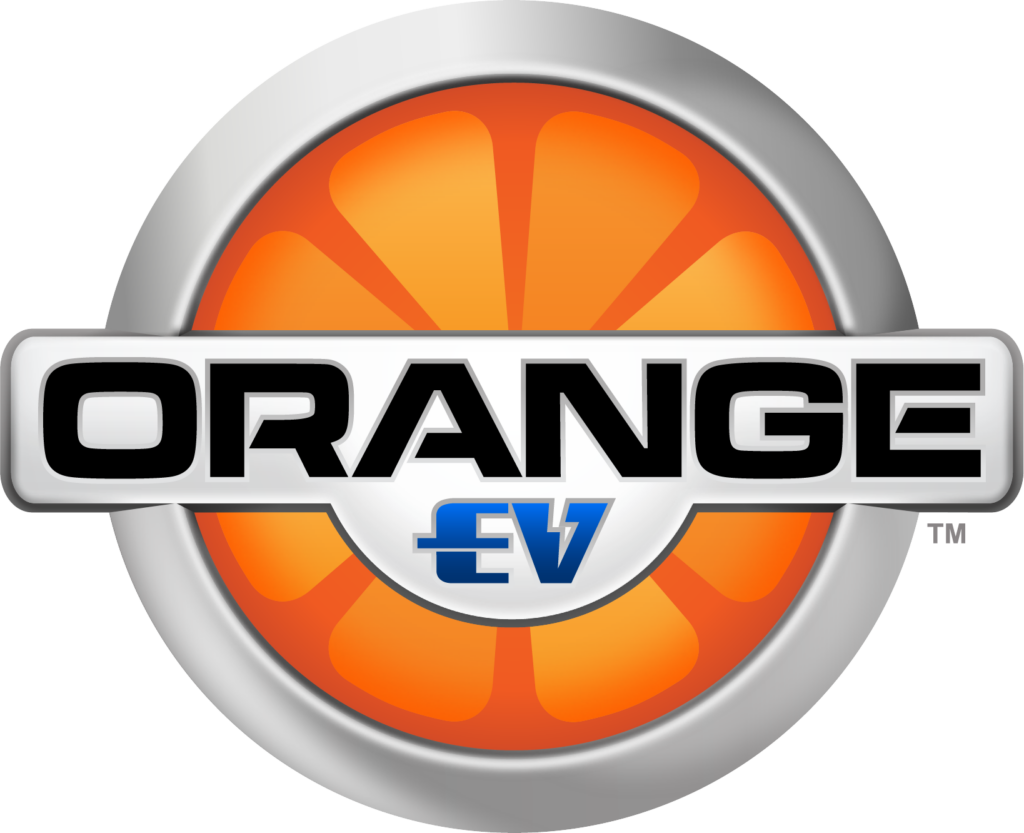Initial Findings
“Through Run on Less Electric – DEPOT we were able to show that adopters of battery electric vehicles have demonstrated that they work at scale in various segments of the trucking industry including vans and step vans, medium-duty box trucks, terminal tractors and heavy-duty regional haul,” says Mike Roeth, executive director, NACFE.
Click here to read more.
Total Cost of Ownership
People ask what the total cost of ownership of a battery electric truck is. The accurate and easy answer is we don’t know yet. The upfront costs, the infrastructure costs, the resale value, the maintenance and repair — a lot of those are unknown at this point.
Managed Charging
Software can help fleets manage their chargers to give them the data they need to make smart charging decisions.
Run on Less – Electric DEPOT Reports
In an effort to help fleets understand the benefits and challenges of battery electric trucks in larger numbers, the North American Council for Freight Efficiency (NACFE) and RMI launched Run on Less – Electric DEPOT (RoL-E DEPOT).
NACFE partnered with 10 fleet depots that were operating at least 15 battery electric vehicles as of June 2023. The majority of fleets with 15 or more electric trucks are in California, but we also had participants in New York and Canada. During the Run, NACFE tracked 22 trucks from the 10 fleet depots.
While trucks are the key element of the Run and having data on a variety of equipment will help fleets operating in a variety of duty cycles learn more about how to add electric vehicles to their operations, RoL-E DEPOT looked at more than the trucks, also focusing on chargers and infrastructure.
The purpose of the 2023 Run was to isolate areas going well and those where the industry is challenged and bring about better and faster solutions for the industry.
NACFE concluded that small depots are ready for electrification now and electrification at large depots is gaining momentum. The infographic below includes additional conclusions.
A VIDEO RECAP OF RUN ON LESS – ELECTRIC DEPOT
The fourth NACFE demonstration focused on scaling commercial battery electric vehicles.
Download the report Electric Truck Depots Are Evolving: How 10 Fleets Grew Their BEV Populations here
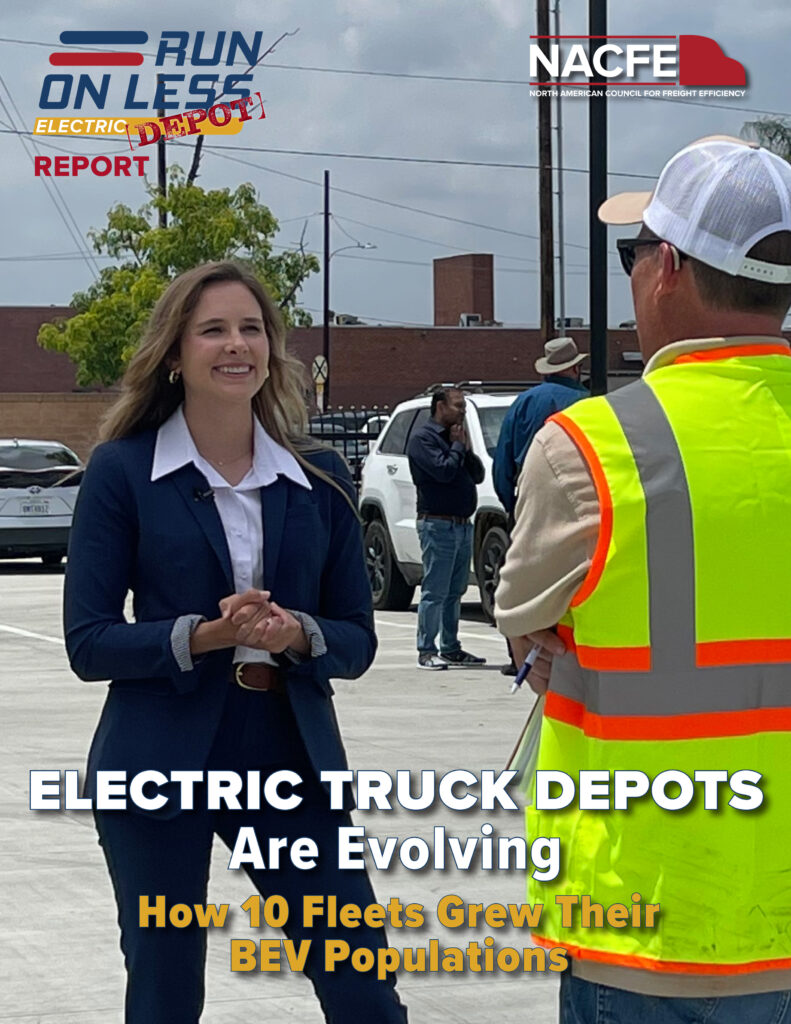
Download the report Run on Less – Electric DEPOT: Scaling BEVs in the Real World here
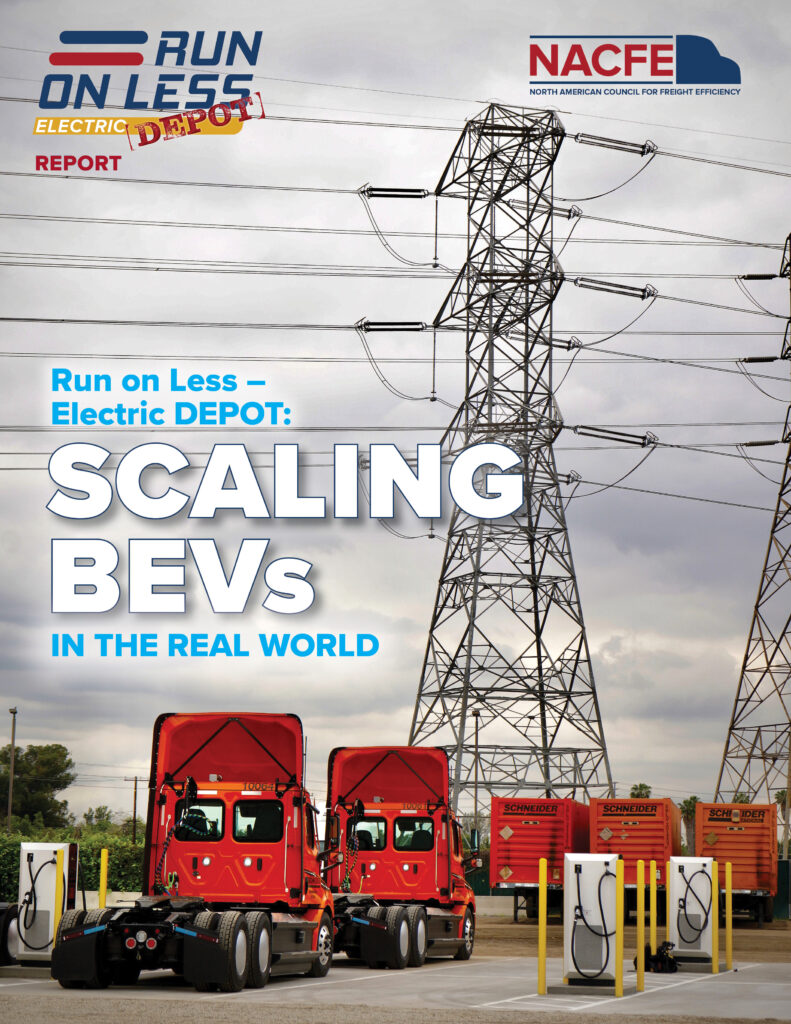
View the Run on Less – Electric DEPOT Fleet Profiles here
View the Run on Less – Electric DEPOT Metrics here
View the Electric Depot Bootcamp trainings here
RESULTS BY DEPOT
DATA SET
All trucks were tracked using Geotab technology capturing total miles driven, miles per day, deliveries per day, battery state of charge, use of regenerative braking and other metrics. A data set is available for download.
INFOGRAPHIC
This infographic illustrates NACFE’s conclusions from Run on Less – Electric DEPOT. Download individual images below, or download a PDF of the entire graphic.
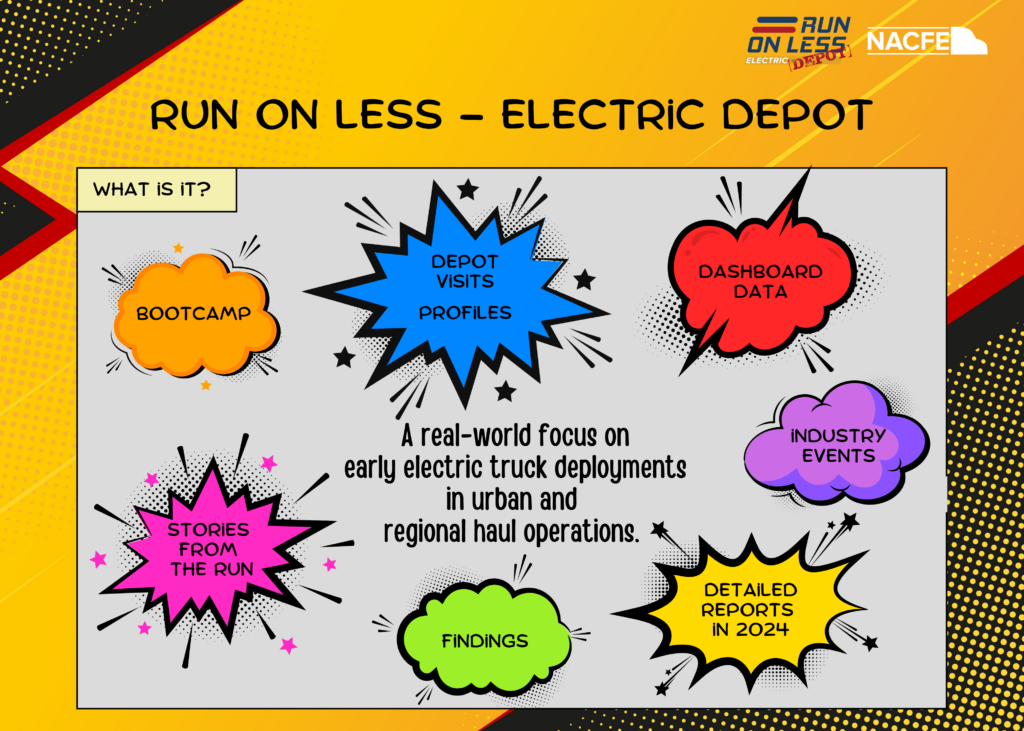
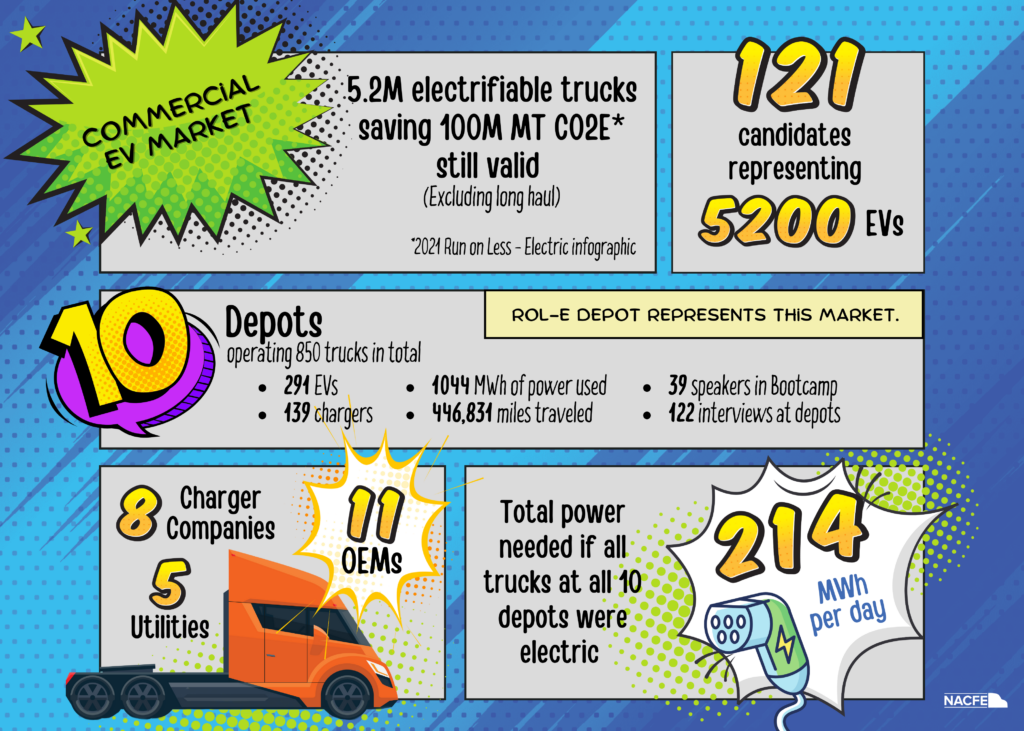
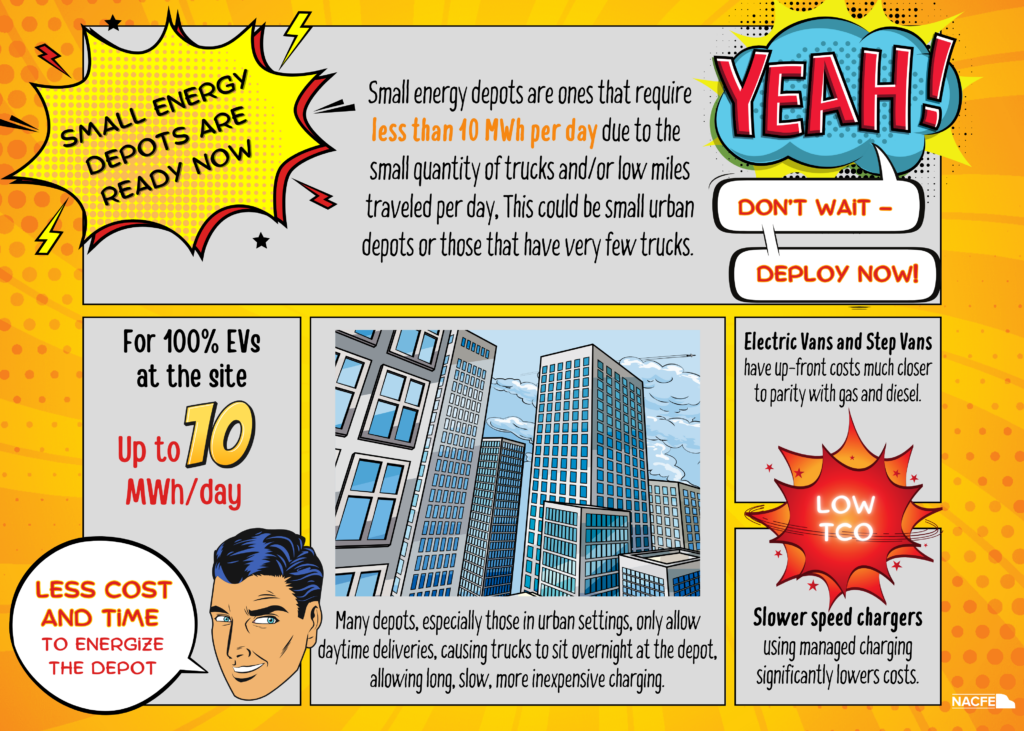
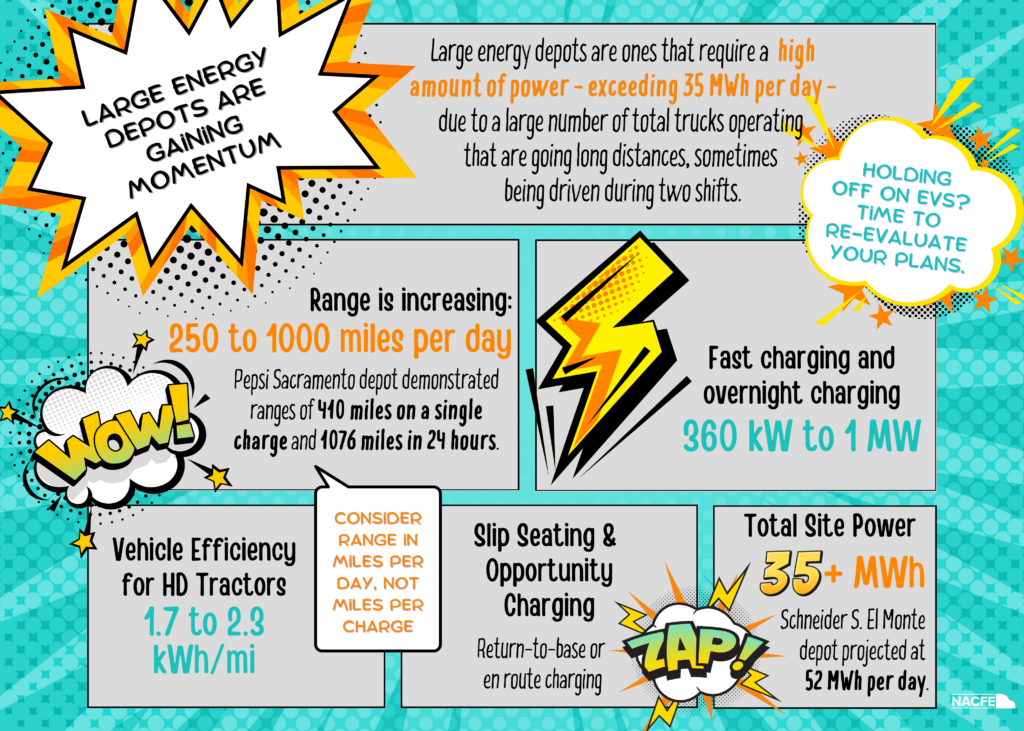
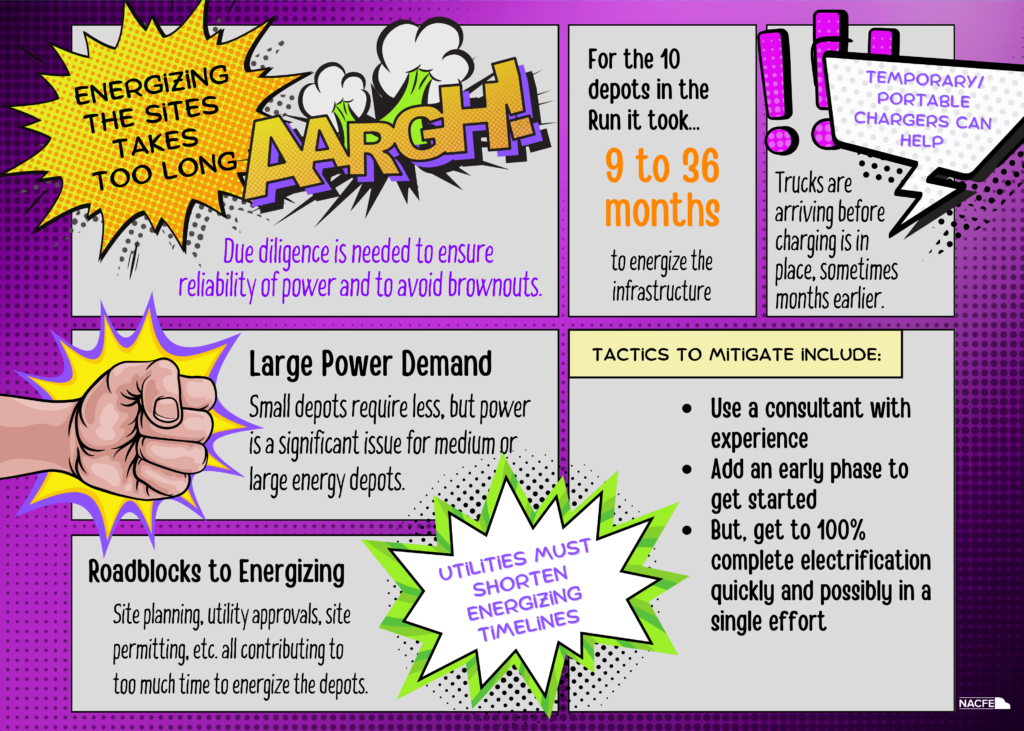
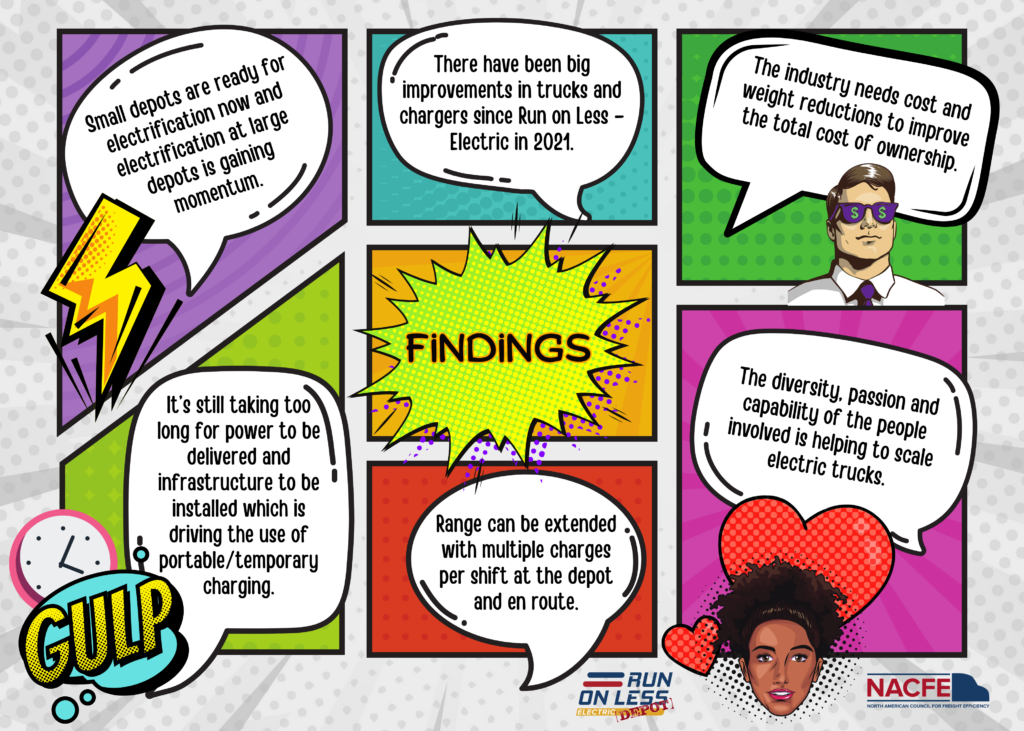
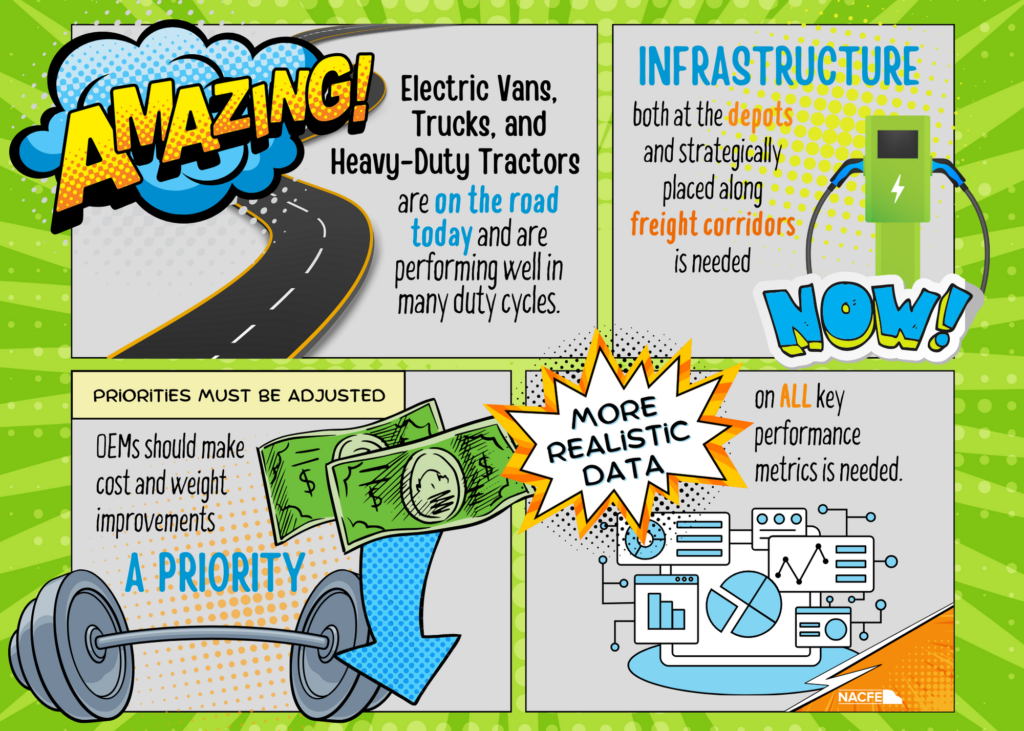
Drivers
Drivers describe electric trucks as a game changer. Every person who gets in the truck drives it, loves it. It has instant acceleration. It is completely quiet. It’s so comfortable and so easy to drive.
Shippers and Zero Emissions
Shippers have increasingly realized that to achieve their own greenhouse gas emissions reduction goals they need to partner with fleets that are very ambitious around reducing their emissions.
Electric Depot Education
Bootcamp Training
The Electric Depot Bootcamp is a 10-part educational series on factors needed to successfully scale electric trucks in fleet operations — hosted by the North American Council for Freight Efficiency (NACFE) and RMI — for fleet managers, utility planners, policymakers, and more. Run on Less – Electric DEPOT (RoL-E DEPOT) this September is focused on fleet depots with 15 or more electric trucks. The Electric Depot Bootcamp is designed to help the entire electric truck ecosystem understand what it takes to move to wider deployment of EVs and is designed to:
- Increase industry awareness of the various entities that need to work together to overcome the challenges of widespread EV deployment
- Provide professional development opportunities to decision-makers at all stages of their electrification journey
- Synthesize quick takeaways and recommendations from NACFE and RMI’s electric truck work to date
- Convene fleets, truck makers, utilities, regulators, NGOs, charging manufacturers, to discuss best practices for scaling EVs at fleet depots.
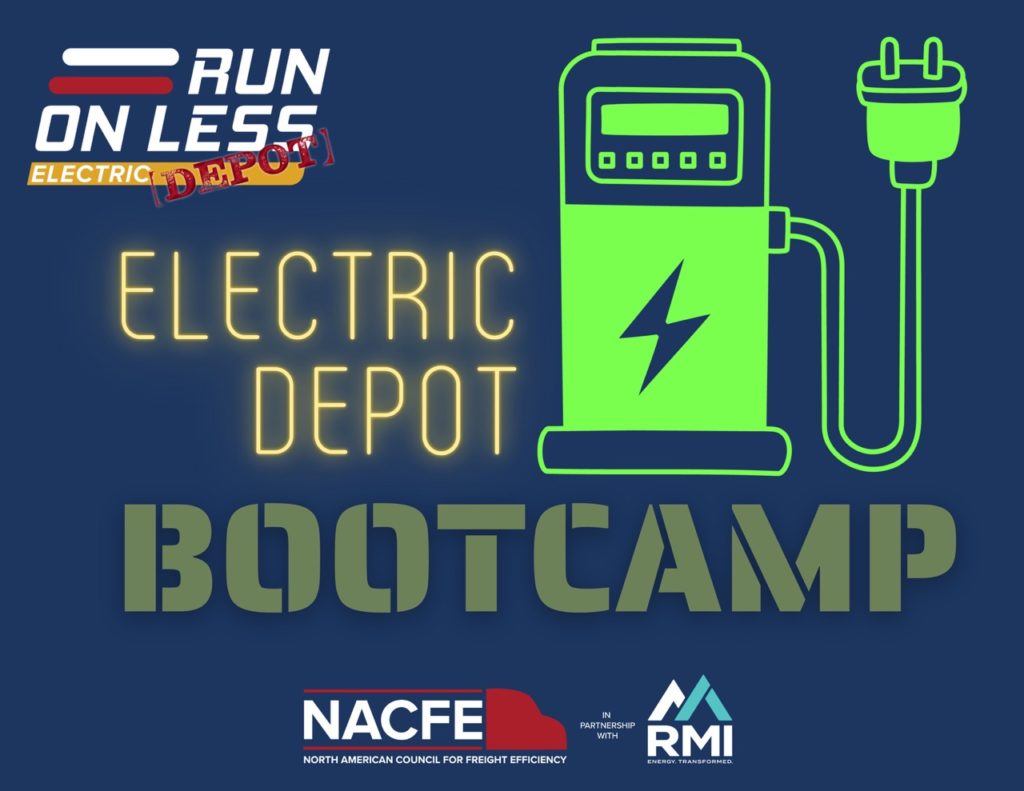
The Electric Depot Bootcamp will be conducted via virtual trainings held biweekly from April through September 2023 leading up to RoL-E DEPOT. The Bootcamp is free to attendees thanks to the generous support of RoL-E DEPOT sponsors. Each training will be recorded and available for viewing via the links below after each session is completed.
Attendees can demonstrate comprehension of the material — via optional online quizzes following each training — and have the opportunity to earn digital badges that recognize their expertise and which can be shared via attendees’ social networks. Badges are available for those who complete one, five, or 10 trainings via runonless.com. Participation in the quizzes and badging system is not required for participation in the Bootcamp trainings. For questions related to the Electric Depot Bootcamp, see our FAQs. For any additional Bootcamp questions, please contact Rachel Ellenberger.
Servicing EVs
Ultimately maintenance on electric trucks should be dramatically reduced compared to diesel trucks. There will not be a lot of brake wear because of the regenerative braking. Electric motors are robust and have a long expected life.
Extended Range
Environmental Justice
Electric vehicles are beginning to be deployed in areas that are typically disadvantaged — places that will really benefit from these trucks.
Diesel trucks are bringing a lot of carbon emission into some communities resulting in high asthma and respiratory illness rates. Transitioning to cleaner fuels is incredibly important not only for the environment but also for public health.
Lessons Learned with Utilites
BEV infrastructure is more in-depth than many people think. There is a learning curve for both the fleet and the utility. Engaging early and working together will ensure a more successful experience.
When it comes to infrastructure, communication between fleets and utilities is critical. And that communication needs to take place early and be transparent.
About Run on Less — Electric DEPOT
The next Run on Less event will focus on likely the biggest challenge to scaling the deployment of electric trucks. Lots of fleets have deployed one or two electric trucks, but few have made the move to having 15 or more trucks. This event, which we are calling Run on Less – Electric DEPOT (RoL-E DEPOT), will feature 10 fleet depots with 15+ Class 3 to 8 battery electric vehicles (BEVs) operating in the U.S., Canada or Mexico.
One of the key learnings from Run on Less – Electric was that the transition to electric vehicles is about much more than just the trucks themselves. It is about charging, infrastructure, grid capacity, resilience, etc. That’s what led us to the idea of RoL-E DEPOT, which will give us the opportunity to learn and share best practices for scaling electric trucks at depots.
In order to ensure the long-term success of electric trucks, we need to start learning from fleets who are beginning to scale their use of electric vehicles.
Our goal is to explain fleet scaling considerations such as charging infrastructure, engagement with utilities, total cost of ownership management, driver and technician training, charge management, etc. We also will highlight effective partnerships between fleets, OEMs, and utilities. And we will take a deep dive look into utilities, charging equipment, construction, etc.
“The Run on Less initiative aligns with our ambition to help decarbonize the commercial road transport sector,” says Tim Murray, general manager of Shell’s Commercial Road Transport business. “The Run demonstrates real-world actions being taken by leading fleet companies who are emerging as industry trailblazers through their collaborative solutions to sustainability challenges.”
Sponsors
As with other Run on Less events, we can’t do this without support from the industry. Since we held our first Run on Less event in 2017, we’ve had strong support from the industry. We expect that will be true as we work on Run on Less – Electric DEPOT. Help make Run on Less – Electric DEPOT a reality and help the whole industry scale the adoption of electric vehicles.
“As a longtime NACFE partner and Run on Less sponsor, we see immense value in industry collaboration and look forward to sharing firsthand the benefits, challenges and lessons learned along our journey to adopting and scaling these exciting technologies,” says Mike O’Connell, vice president, supply chain at PepsiCo and former NACFE board chairman.
Get Involved With RoL-E DEPOT
Those who partner with NACFE in a Run on Less event — fleets, OEMs, sponsors, etc. — help us spread the word about the event and its findings through their own networks. This is just one of many ways our partners help us before, during and after the event. Find out what’s entailed in partnering with NACFE on Run on Less.
“The Run on Less roadshow presents valuable learning and collaboration opportunities for fleets, OEMs, suppliers and the industry at large,” says Amanda Phillips, North American regional lead for Cummins-Meritor, which is also one of this year’s Run on Less sponsors. “The opportunity to share insights and help more fleets embrace zero-emission technologies benefits not only our customers and partners, but also our communities and the environment.”
Whether you sponsor the Run, participate in it or simply follow it, we are grateful for your support of our efforts to move to a zero-emissions future.
Follow Run on Less – Electric DEPOT on Twitter at @RunOnLess.
DEPOT Project Locks In 8 Participants
NACFE shares names of fleets joining Run On Less – Electric DEPOT — This fall, 8 fleet depots will help showcase what it takes to move from one or two electric vehicles to 15 or more.
Best Practices for Utility-Fleet Relationships
Trucking fleets and electric utilities are getting to know each other. What’s common practice in one industry may be novel in another. Learn from some of the fleets and utilities most knowledgeable in trucking electrification to understand what to expect when transitioning to electric trucks.
Join this one-hour webinar to:
Learn from fleets’ experience getting electric service to their electric trucks.
Understand how utilities can best meet their fleet customers’ needs
Explore what construction considerations must be made before the utility will begin work with the fleet
Bootcamp speakers include:
Resources
- Oncor EVolution Program (Oncor)
- Zeem Solutions in the News (Zeem)
- Charge Ready Transport Program (Southern California Edison)
- Working with Your Utility (Environmental Defense Fund)
Grants and Incentives for the Trucks and Infrastructure
Multiple forces are driving the expansion of vehicle electrification; state and national priorities, manufacturers competing for market share, utilities’ desire to serve more customers, and more are unearthing new sources of financial and technical support for fleet electrification. Experts in this session will provide guidance on how to navigate the incentive ecosystem and make decisions best aligned with your use case.
Join this one-hour webinar to:
Learn about the similarities and differences between state, federal, and utility incentives
Understand how to prioritize opportunities based on your operations
Discover what the future incentive landscape will look like as the industry continues to grow
Unlock industry resources that consolidate and vet incentives
Bootcamp speakers include:
Resources
- EV Funding Finder (Electrification Coalition)
- Incentives for Clean Buses and Trucks (California HVIP Program)
- Incentives for Commercial Zero-Emission Vehicle Infrastructure (EnergIIZE)
- Voucher Incentive Programs (CALSTART)
- Truck Resources (CALSTART)
- System for Award Management – SAM.gov
- Grants.gov
- State of Sustainable Fleets 2023 (State of Sustainable Fleets)
Electric Truck Developments
Truck OEMs and their component suppliers continue to mature the performance, cost, reliability, durability and specification availability of their trucks. Experts will share future enhancements and anticipated timing.
Join this one-hour session to:
Understand the scope of where electric trucks are today and where there is room for future improvements
Explore potential impacts new technologies will have on existing infrastructure
Learn what new technologies are being considered
Gain insight into the timing of the roll-out of new technologies
Bootcamp speakers include:
Resources
Faster Charging — Opportunities and Challenges at 350KW and Higher
Most commercial vehicle charging today is limited to between 150 and 350 kW. While charging at this level meets the needs of many fleets, as the use of commercial battery electric vehicles expands, there will be use cases that will benefit from higher-powered charging, adding hundreds of miles of range to a heavy-duty truck during a rest break. Experts in this session will discuss the opportunities and challenges of moving to much faster charging speeds.
Learn about emerging truck and charging infrastructure technologies supporting higher-power charging
Understand the use cases where high-power charging makes sense and the challenges of managing high-power charging
Explore the forecasted utility pressures and opportunities of electric fleet customers charging at very high levels
Learn about actions to take to support high-power charging at the fleet and utility level
Bootcamp speakers include:
Resources
- CharIN Whitepaper Megawatt Charging System (MCS) (CharIN)
- The Electric Truck Research and Utilization Center (CALSTART/EPRI)
- DOE FAQ on Megawatt Charging (Argonne National Lab)
- Megawatt Scale Charging System Architecture (OSTI)
- Grid-related Challenges of High-power & Megawatt Charging (EV Market Reports)
Opportunities to Extend BEV Range
Vehicle range is currently — and will always be — a concern of electric trucks given the cost, size and weight of batteries. Cold weather, heavy loads, and more challenging topography require more battery capacity. During this session, experts will offer options such as en route, extremely fast, and wireless charging, as well as other strategies to get more miles out of these trucks.
Join this one-hour session to:
Understand what is needed and why for long-haul freight
Discover why liquid hydrogen is a choice for long-haul freight
Learn the use-case for renewable natural gas and renewable diesel hybrids
Explore how pure battery-electric vehicles can extend range
Bootcamp speakers include:
Resources
- Drayage Electrification (NREL)
- H2 Drayage (Port of Los Angeles)
- Yard Tractor Electrification Study (NREL)
- The Need for Hydrogen Trucking (H2Accelerate)
Electricity Resiliency and Availability
Planning for resiliency is different with electric trucks. Businesses need to continue to run even when the power is out. Renewable energy generation, battery backups, even onsite electric generator sets are all options to improve resiliency. In this session, experts will share their recommendations for scalable solutions to keep your operations active during volatile power periods.
Join this one-hour webinar to:
Understand necessary resiliency considerations for your use-case and operation size
Explore the opportunities and challenges of available solutions
Project-out market developments for resiliency solutions
Learn how investments today will save future downtime
Bootcamp speakers include:
Resources
- 2021 Annual Electric Reliability Report (SoCal Edison)
- Electric System Reliability Annual Reports (California Public Utilities Commission)
- REopt Web Tool (NREL)
- REopt Web Tool User Guides (NREL)
- Case Study: REopt Evaluates Electric Vehicle Charging Stations for the Vehicle Technologies Office (NREL)
Current and Future Regulations for Zero Emission Trucks
Local, state and federal regulations are in the press all the time. Our experts will help clarify the various laws and regulations to help fleets, manufacturers, and others understand how they affect their business in various regions.
Join this one-hour session to:
Learn how regulations help technology adoption
Hear how OEMs are helping fleets navigate the regulations
Understand where the rules are applicable across U.S. and Canadian states, provinces, and cities
Learn how to consider timing and planning for your fleet’s future
Bootcamp speakers include:
Resources
- Proposed Rule: Greenhouse Gas Emissions Standards for Heavy-Duty Vehicles – Phase 3 (EPA)
- Greenhouse Gas Emissions Standards for Heavy-Duty Vehicles – Phase 3 Fact Sheet (EPA)
- 2022 Transmission & Substation Design & Operation Symposium Conference Paper (ElectroTempo)
- 5 Effective Policies for Vehicle Electrification (ICCT)
- 5 Effective Policies for Heavy-Duty Vehicle Electrification (ICCT)
Selecting and Managing Cost-Effective Charging
Unlike diesel fuel, the price of electricity depends on more than how much you use. The utility, electricity tariffs, peak usage, and demand charges can all impact the bill. Selecting the right charging hardware and software is critical to keep energy bills low and ensure adequate charging capacity. In this session, experts will discuss how to capitalize on your existing data to select charging equipment and strategically manage fleet charging.
Understand the landscape of charging equipment
Learn about key considerations to be made before selecting charging equipment
Discover strategies for minimizing peak load charging rates
Discover how existing, diesel fleet data can assist in charging hardware and software decisions
Bootcamp speakers include:
Resoures
Scaling Charging Infrastructure Equipment
As the market continues to move toward electrification, fleets need to consider how they will continue the transition from ICE vehicles to EVs. From increasing the number of chargers from a dozen to hundreds, to future-proofing your operations, growing fleet electrification impacts time, cost, and complexity. In this session, industry experts will share how to build smarter and show what big truly looks like for audiences at steps in the electrification journey.
Join this one-hour webinar to:
Look to the future of large-scale electrification best practices
Understand the impact charging growth has on your operations
Learn how to account for future costs from initial electrification investments
Explore how to position your operations best for future successes
Bootcamp speakers include:
Resources
Electric Depot Site Planning and Construction
As fleets begin planning their transition to electrification, many considerations must be made. What are best practices for site planning, permitting, and coordinating with utilities? What is expected during the construction phase? How do teams keep their project on schedule? Get answers to these questions and more during this session.
Join this one-hour session to:
Learn how to reduce installation costs through site planning best practices
Understand utility processes and timelines from initiation to energizing
Discover how best to work with your jurisdiction on permitting
Master maintaining current operations during project construction
Bootcamp speakers include:
Resources
- EV Infrastructure Challenge (Blog) (WB Engineering)
- Electric Vehicle Innovation and Design Center (WB Engineering)
- Verge Workshop Presentation (NextEra Energy)
- In-Charge Making EV Charging Stations for Nationwide Fleets (InCharge)
- Real Estate Identification and Acquisition for Electrification at Scale (Playbook) (Voltera)
- How Voltera Landed a Site for 60+ Class 8 Trucks Near the Port of Long Beach (Voltera)
